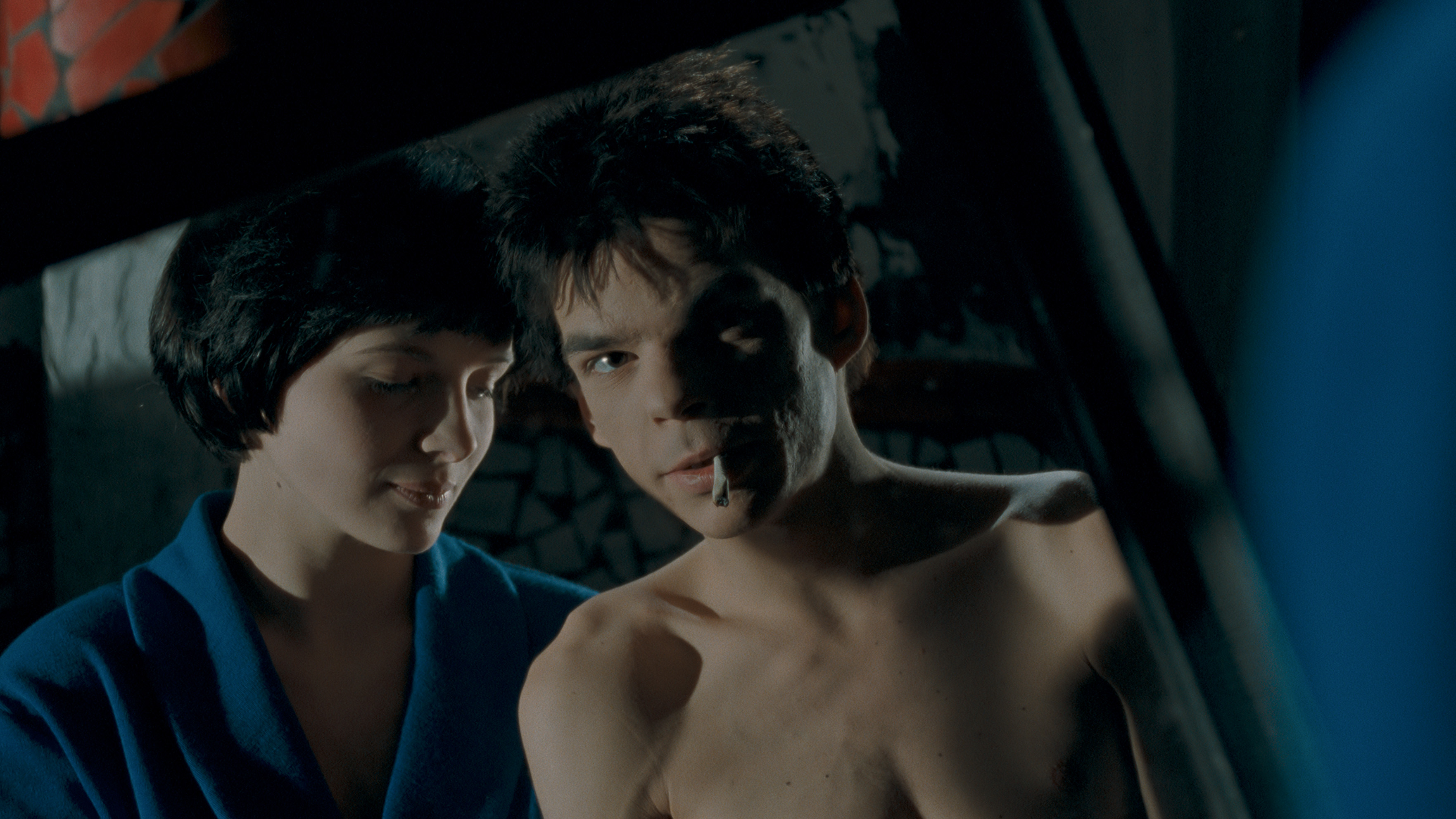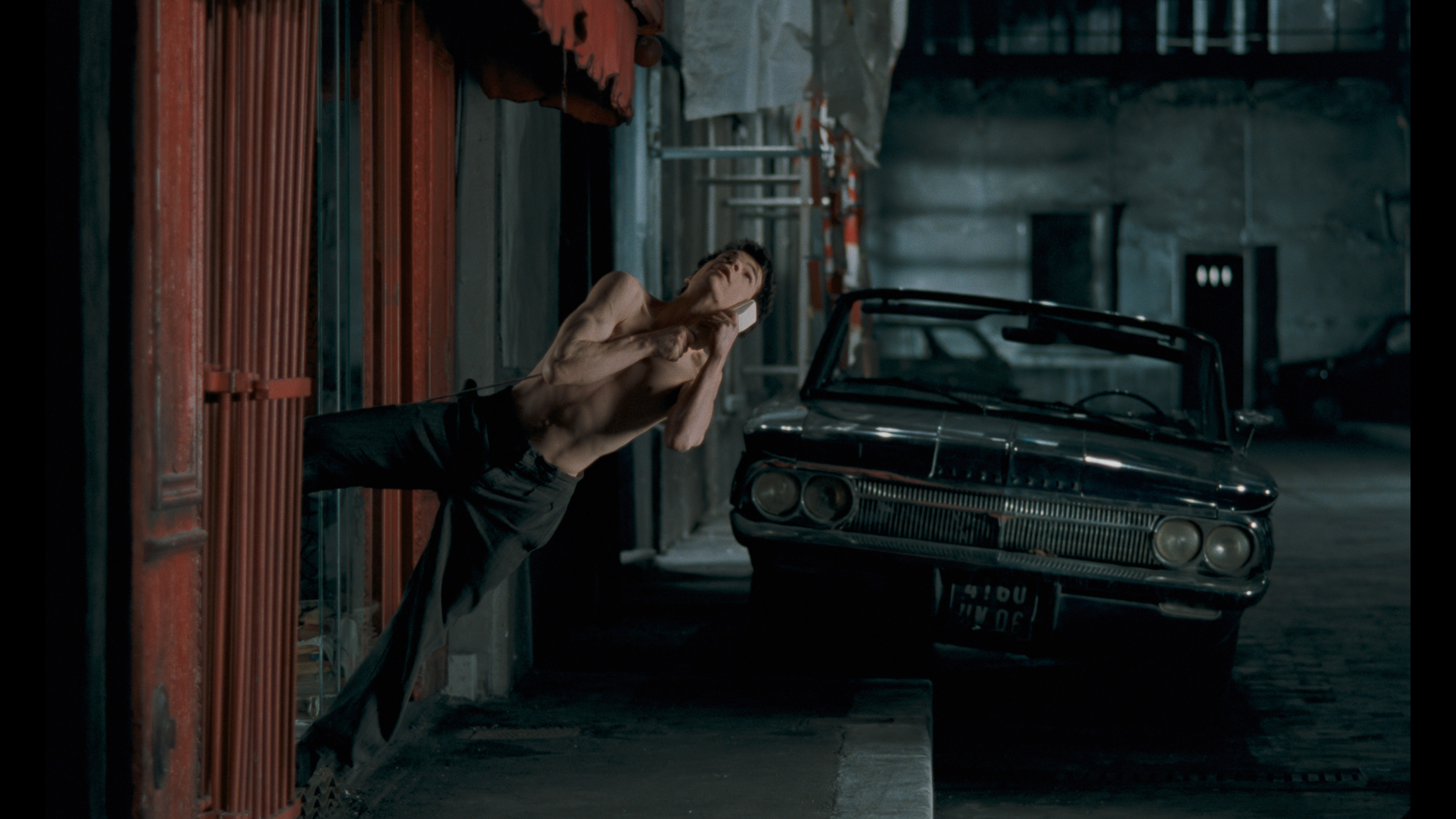MAUVAIS SANG (1986)




8:30 PM, Friday April 28
World Premiere: Introduced by Ivan Cerecina
Randwick Ritz
Director: Leos Carax
Country: France
Year: 1986
Runtime: 116 minutes
Rating: U15+
Language: French, English subtitles
TICKETS ⟶
World Premiere: Introduced by Ivan Cerecina
Randwick Ritz
Director: Leos Carax
Country: France
Year: 1986
Runtime: 116 minutes
Rating: U15+
Language: French, English subtitles
TICKETS ⟶
MAUVAIS SANG/ BAD BLOOD
WORLD PREMIERE OF THE 4K RESTORATION
“In this his second feature, Leos Carax lives up to his billing as 'the natural heir of Jean-Luc Godard.'" – New York Times
Cinema Reborn proudly presents the World Premiere screening of the new 4K restoration of Leos Carax’s poetic and tragic love story. Teenagers are caught up in a sexually transmitted plague that leaves them emotionless and unable to commit to relationships. There’s a medical antidote, but the government has it locked away and two old crooks have been tasked with stealing it. Carax’s stylish, invigorated direction makes references to cinema history as Mauvais Sang presents its distinctive take on Modern Love (with thanks to David Bowie).
“A masterpiece of ecstatic cinema from 1986, directed by Leos Carax at the age of twenty-five.” — The New Yorker
“A salute, at once moody and ebullient, to the cinema of the past and the ferocious intensity of youth.” — The Village Voice
“The kind of movie that, even on a third viewing, makes you ashamed of the last 100 movies you watched.” — Otie Wheeler
The 8:30pm on Friday 28 April will be introduced by Ivan Cerecina, who is currently working on a book on the idea of montage in post-war French film.
WORLD PREMIERE OF THE 4K RESTORATION
“In this his second feature, Leos Carax lives up to his billing as 'the natural heir of Jean-Luc Godard.'" – New York Times
Cinema Reborn proudly presents the World Premiere screening of the new 4K restoration of Leos Carax’s poetic and tragic love story. Teenagers are caught up in a sexually transmitted plague that leaves them emotionless and unable to commit to relationships. There’s a medical antidote, but the government has it locked away and two old crooks have been tasked with stealing it. Carax’s stylish, invigorated direction makes references to cinema history as Mauvais Sang presents its distinctive take on Modern Love (with thanks to David Bowie).
“A masterpiece of ecstatic cinema from 1986, directed by Leos Carax at the age of twenty-five.” — The New Yorker
“A salute, at once moody and ebullient, to the cinema of the past and the ferocious intensity of youth.” — The Village Voice
“The kind of movie that, even on a third viewing, makes you ashamed of the last 100 movies you watched.” — Otie Wheeler
The 8:30pm on Friday 28 April will be introduced by Ivan Cerecina, who is currently working on a book on the idea of montage in post-war French film.
FILM NOTES
Leos Carax
By Adrian Martin
“The spectator’s identification cannot be more profound than with the character of the orphan, the child alone in the dark”. Leos Carax is someone who has not only embraced the dream of cinephilia, but also lived out its fullest consequences, come what may. In love with films from an early age, he became not only a teenage “cinémathèque rat” but, briefly, also a precocious contributor to Cahiers du cinéma. His ode to the cinephile as orphan (in a memorable review of Sylvester Stallone’s Paradise Alley [1978]) is the key to his self-reinvention: born Alex Dupont (his mother Joan is a film journalist), he created a new name which is an anagram of Alex Oscar, i.e., winner of an Academy Award!
After several shorts, Carax burst forth with his black-and-white debut feature Boy Meets Girl in 1984. It announces the unusual amalgam of elements and influences that have defined his style to this day: an adoration of silent (and especially expressionist) cinema; a taste for the magic of Jean Cocteau; a will to revive the Nouvelle Vague (Godard in particular); and an intimate, sometimes cryptic autobiographical level that owes much to his friend and mentor, Philippe Garrel. True to the 1980s, Carax also reached for a New Romanticism that mixed pop culture formats and genres with cutting-edge technology – he has often spoken of his fascination with the birth of the modern “electric world”. In this and in the subsequent, already much more ambitious Mauvais sang (1986), Carax revealed himself (as all the making-of documentaries show) to be a meticulous craftsperson in the tradition of Josef von Sternberg – even when his films look spontaneous and delirious, they are carefully planned and executed by himself and a recurring team that includes cinematographers Jean-Yves Escoffier (died 2003) or Caroline Champetier and editor Nelly Quettier, not to mention the on-screen alter egowhose acting stardom he helped propel: Denis Lavant.
After such a strong beginning, the 1990s and 2000s were not easy decades for Carax. Les Amants du Pont-Neuf (known in English as Lovers on the Bridge, 1991) is among the masterpieces of the ‘90s, but its reception was dogged by industry gossip surrounding a disaster-prone production. Pola X (1999), his most hermetic work (adapted from Herman Melville), affords a coded glimpse into threads of the director’s private life: having already been the lover of several of his “leading ladies” (including Juliette Binoche), he now entered into a close relationship with charismatic Lithuanian filmmaker Sharunas Bartas and his wife, Katerina Golubeva (who committed suicide in 2011). Carax’s daughter with Golubeva, Nastya, today appears in her father’s films.
Another thirteen years would pass – in which he made only a handful of shorts, including surreal music videos for Carla Bruni (wife of former French President Nicolas Sarkozy) – before Carax returned to the limelight with Holy Motors (2012), an inspired, endlessly inventive mosaic that carries traces of several previous, unmade projects. Cinema reborn, indeed! It took another nine years (including the start of a global pandemic) for Carax’s musical collaboration with Sparks, Annette (2021), to reach screens – a lyrical, tormented tale that once again offers a disguised, dreamlike version of incidents and currents from his life.
The Film
By Eddie Cockrell
By Eddie Cockrell
In what
serves as the near future of it’s 1986 release date, Leos Carax’s second film, Mauvais Sang, the title of which come
from Arthur Rimbaud’s 1873 extended prose poem Une Saison et Enfer (A Season in
Hell, which translates literally as Bad Blood but was also called The Night is
Young in some English language markets) concerns the adventures of the young Alex
(Denis Lavant). A mysterious epidemic looms that exclusively threatens young
people who have impersonal sex and he becomes ensnared not only with gangster
Marc (the great Michel Piccoli) but the older man’s mistress Anna and Alex’s
own teenaged girlfriend Lise (Juliette Binoche and Julie Delpy, respectively,
both breathtakingly luminous).
Yet for the receptive viewer Mauvais Sang is a visionary yet somehow classic French caper film—a genre inspired by Hollywood studio films noir but adapted brilliantly to Paris and its surrounds by a legion of domestic filmmakers—that masquerades, barely, as an art-house movie in the romantic tradition of the avant-garde master artist Jean Cocteau (La Belle et la Bête) and the gloriously unhinged do-or-die spirit of Jean-Luc Godard (Breathless is the obvious inspiration here).
Note there’s a disarmingly off-handed meticulousness to the film that belies its inspiration from the French New Wave. That attention to detail is a career-spanning trait for which Carax has become known, and is evidenced here by his sure hand at blocking and close-ups, as well as the commanding yet markedly intuitive cinematography of the late Jean-Yves Escoffier. Perhaps the best, and certainly the most emotional, examples of this collaboration (Escoffier also shot both Carax’s debut film Boy Meets Girl and the 1991 Les Amants du Pont-Neuf) are the set-pieces for which Mauvais Sang is best known: the terrifying yet somehow exhilarating skydiving sequence and Lavant’s lacerating but joyous blocks-long dance to David Bowie’s Modern Love (Carax also uses the music of Benjamin Britten and Sergei Prokofiev to make his points).
In his introduction to the sweepingly epic live version of the Velvet Underground chestnut Sweet Jane in front of a packed house on a rainy night in May 1978 at Manhattan’s legendary and now-shuttered Bottom Line nightclub in New York City, the eternal maverick Lou Reed announced “I’m gonna quote a line from Yeats, I think it is… ‘The best lack all conviction and the worst are filled with a passionate intensity.’ Now you figure out where I am.”
A random observation in this context to be sure, but the juxtaposition fits snugly with the legacy of Mauvais Sang, which displays Carax at the height of his passion and his powers.
“You many change your mind,” someone says early in the film. “It’s easy at your age.” As single-minded a sophomore effort as one could wish for given his then-tender years, Carax’s tribute to what came before leaves no doubt where he falls on Yeats’ scale. Mauvais Sang is nothing if not the poster child for passionate intensity; in a perfect world of inspiring and exhilarating cinema, Carax is holed up somewhere preparing a new film.
Please don’t make us wait too long.
Yet for the receptive viewer Mauvais Sang is a visionary yet somehow classic French caper film—a genre inspired by Hollywood studio films noir but adapted brilliantly to Paris and its surrounds by a legion of domestic filmmakers—that masquerades, barely, as an art-house movie in the romantic tradition of the avant-garde master artist Jean Cocteau (La Belle et la Bête) and the gloriously unhinged do-or-die spirit of Jean-Luc Godard (Breathless is the obvious inspiration here).
Note there’s a disarmingly off-handed meticulousness to the film that belies its inspiration from the French New Wave. That attention to detail is a career-spanning trait for which Carax has become known, and is evidenced here by his sure hand at blocking and close-ups, as well as the commanding yet markedly intuitive cinematography of the late Jean-Yves Escoffier. Perhaps the best, and certainly the most emotional, examples of this collaboration (Escoffier also shot both Carax’s debut film Boy Meets Girl and the 1991 Les Amants du Pont-Neuf) are the set-pieces for which Mauvais Sang is best known: the terrifying yet somehow exhilarating skydiving sequence and Lavant’s lacerating but joyous blocks-long dance to David Bowie’s Modern Love (Carax also uses the music of Benjamin Britten and Sergei Prokofiev to make his points).
In his introduction to the sweepingly epic live version of the Velvet Underground chestnut Sweet Jane in front of a packed house on a rainy night in May 1978 at Manhattan’s legendary and now-shuttered Bottom Line nightclub in New York City, the eternal maverick Lou Reed announced “I’m gonna quote a line from Yeats, I think it is… ‘The best lack all conviction and the worst are filled with a passionate intensity.’ Now you figure out where I am.”
A random observation in this context to be sure, but the juxtaposition fits snugly with the legacy of Mauvais Sang, which displays Carax at the height of his passion and his powers.
“You many change your mind,” someone says early in the film. “It’s easy at your age.” As single-minded a sophomore effort as one could wish for given his then-tender years, Carax’s tribute to what came before leaves no doubt where he falls on Yeats’ scale. Mauvais Sang is nothing if not the poster child for passionate intensity; in a perfect world of inspiring and exhilarating cinema, Carax is holed up somewhere preparing a new film.
Please don’t make us wait too long.
Credits
Bad Blood aka The
Night is Young | Director: Léos CARAX
| France | 1986 | 116 mins. | 2K Flat DCP (orig. 35mm, 1.66:1) | Colour | Mono Sd.
| French with Eng. Subtitles | U/C15+.
Production Companies: Soprofilms, FR3 Films, Unité 3, CNC, Sofima, Les Films Plain-Chant | Producer: Alain DAHAN | Script: Léos CARAX | Photography: Jean-Yves ESCOFFIER | Editor: Nelly QUETTIER | Production Design: Michel VANDESTIEN, Thomas PECKRE, Jacques DUBUS | Costumes: Robert NARDONE, Dominique GREGOGNA, Martine METERT | Sound: Harrik MAURY, Joël RIANT, Claude HIVERNON, Henri MORELLE, Julien CLOQUET, Jacques LÉVY, Gérard ROUSSEAU, Hélène MULLER, Jérôme LÉVY | Choreography: Christine BURGOS.
Cast: Dennis LAVANT (‘Alex’), Juliette Binoche (‘Anna’), Michel Piccoli (‘Marc’), Hans MEYER (‘Hans’), Julie DELPY (‘Lise’), [Léos CARAX (‘The Voyeur’), uncredited].
Production Companies: Soprofilms, FR3 Films, Unité 3, CNC, Sofima, Les Films Plain-Chant | Producer: Alain DAHAN | Script: Léos CARAX | Photography: Jean-Yves ESCOFFIER | Editor: Nelly QUETTIER | Production Design: Michel VANDESTIEN, Thomas PECKRE, Jacques DUBUS | Costumes: Robert NARDONE, Dominique GREGOGNA, Martine METERT | Sound: Harrik MAURY, Joël RIANT, Claude HIVERNON, Henri MORELLE, Julien CLOQUET, Jacques LÉVY, Gérard ROUSSEAU, Hélène MULLER, Jérôme LÉVY | Choreography: Christine BURGOS.
Cast: Dennis LAVANT (‘Alex’), Juliette Binoche (‘Anna’), Michel Piccoli (‘Marc’), Hans MEYER (‘Hans’), Julie DELPY (‘Lise’), [Léos CARAX (‘The Voyeur’), uncredited].
